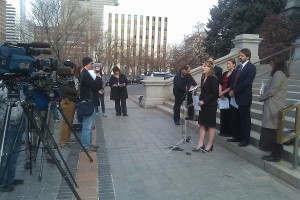No decent reporter would let federal candidates get away with saying abortion issues don’t matter
Wednesday, November 30th, 2011You wonder how anyone could read former Colorado Senator Hank Brown’s recent comments to Republicans, that a federal candidate’s position on abortion really doesn’t matter, and not think of failed Colorado Senate candidate Ken Buck, Rep. Cory Gardner, and others who made similar statements, even though a quick Google search shows just how incredibly important abortion issues are in politics at the federal level.
Here’s what Brown said Thursday, as quoted by the Colorado Statesman:
Noting that he suspected most of the Republicans in the room disagreed with him about that — and adding that “Colorado, as you know, is the second-most pro-choice in the nation” — he argued that the [abortion] issue shouldn’t take center stage in elections because it’s out of the hands of politicians in Washington and just divides voters.
“The reality is, that’s a constitutional interpretation. The people you elect on that issue don’t have anything to do with that. You don’t vote on allowing or not allowing abortion in the U.S. Senate or the U.S. Congress. It’s never even an issue,” he said, adding that most Republicans agree the federal government shouldn’t subsidize abortions.
“So for Republican candidates, there isn’t any aspect of that pro-life, pro-choice issue that ever results in a vote in Congress,” he said, noting that in rare cases Senators can weigh in on the fitness of Supreme Court nominees and influence longer-term policy on abortion.
Thank goodness reporters in Colorado didn’t let Ken Buck get away with it when he said essentially the same thing last year.
Here’s a fine example of a reporter holding Buck’s feet to the fire in one televised debate, if you want to take a trip down memory lane. That’s just one case of Colorado journalists doing their jobs and mapping out the steps of the abortion buckpedal for citizens. The Ft. Collins Coloradoan didn’t let Gardner forget his stances on abortion either.
If you look at what happens in Congress, you can see that reporters are obviously right that these issues are not just abstract theoretical distractions, like Hank Brown would have you believe.
They make a big difference in politics as practiced in the Beltway, where you can’t predict what votes will be taken for what reason and when.
Remember that Obamacare almost fell apart over abortion wedge issues, with Democrats and Republicans falling on both sides.
And in March, abortion issues, including a dispute over funding for Planned Parenthood, nearly shut down the federal government, as negotiations stalled, with Gardner and Tipton among those digging in their feet on abortion. Also on the disputed chopping block were federal funds for international organizations that provide women’s health care in the world’s most impoverished countries, where the absence of these services translates into hundreds of thousands of deaths each year.
Maybe some people don’t want to take it seriously that the national GOP platform calls not only for an anti-abortion amendment to the U.S. Constitution, but also for legislation changing the definition of a person under the 14th Amendment to include fertilized eggs, or zygotes. But how can you not take this seriously, given the strange unpredictability of abortion politics and that the GOP has a shot at controlling both houses of Congress and the White House in about a year?
Herman Cain, Newt Gingrich, Cory Gardner, Mike Coffman, Doug Lamborn, Scott Tipton, or any other federal candidate, can’t say they favor personhood and then expect it to mean nothing to reporters. Sorry.
Reporters know that one of their most basic functions is to air out issues so citizens can understand where the candidates stand and what they’ll do if elected.
And so, Hank Brown, with due respect, journalists were right in 2010 not to accept the GOP post-primary cries that abortion issues mattered so little compared to jobs that they need not be discussed. And they should continue to matter a lot to journalists today and every day.


